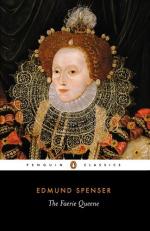56. POURD OUT, a metaphor borrowed from Euripides (Herac., 75) and Vergil (Aeneid, ix, 317).
62. HIS LOOSER MAKE, his too dissolute companion.
67. AN HIDEOUS GEANT, Orgoglio, symbolizing Inordinate Pride, and the Pope of Rome, who then claimed universal power over both church and state (x). For a list of many other giants of romance see Brewer’s Handbook, pp. 376-379.
104. THAT DIVELISH YRON ENGIN, cannon. The invention of artillery by infernal ingenuity is an old conception of the poets. There is a suggestion of it in Vergil’s Aeneid, vi, 585 seq., which is elaborated in Ariosto’s Orlando Furioso, ix, 91, which Milton in turn imitated in Paradise Lost, vi, 516 seq. So in the romance of Sir Triamour.
112. TH’ ONELY BREATH, the mere breath.
119. DO HIM NOT TO DYE, slay him not; cf. “done to death.”
138. A MONSTROUS BEAST, on which the woman of Babylon sat; Revelation, xiii and xvii, 7.
139. This refers to the Romish policy of fostering ignorance among its members.
140. THAT RENOWMED SNAKE, the Lernaean Hydra, a monster with nine or more heads, offspring of Typhon and Echidna. It was slain by Hercules. STREMONA is a name of Spenser’s own invention.
147. The reference is to the cruelty and insensibility of the Romish Church.
150. Its tail reached to the stars. Revelation, xii, 4.
155. AND HOLY HEASTS FORETAUGHT, and holy commands previously taught (them).
161. HIS FORLORNE WEED, his abandoned clothing.
165. MONIMENTS, the sorrowful, mournful relics.
182. SO HARDLY HE, etc. So he with difficulty coaxes the life which has flown to return into her body. According to the Platonic teaching, the body is the prison-house of the soul. Cf Psalms, cxlii, 7.
202. BUT SEELED UP WITH DEATH, but closed in death. “Seel” was a term in falconry, meaning “to sew up” (the eyes of the hawk).
219. THE BITTER BALEFULL STOUND, the bitter, grievous moment during which she listens to the story.
220. IF LESSE THEN THAT I FEARE, etc., if it is less bitter than I fear it is, I shall have found more favor (been more fortunate) than I expected.
231. SORROWFULL ASSAY, the assault of sorrow (on her heart).
236. WAS NEVER LADY, etc., there never was lady who loved day (life) dearer.
249. A GOODLY KNIGHT. Prince Arthur, son of King Uther Pendragon and Queen Ygerne, the model English gentleman, in whom all the virtues are perfected (Magnificence). According to Upton and most editors, Prince Arthur represents Lord Leicester; according to another tradition, Sir Philip Sidney. Could the author have possibly intended in him compliment to Sir Walter Raleigh? See Spenser’s Letter to Raleigh. Arthur is the beau ideal of knighthood, and upon him the poet lavishes his richest descriptive powers. His armor, his shield Pridwen, his lance Roan, and sword Exculibur, were made by the great enchanter Merlin in the isle of Avallon.




